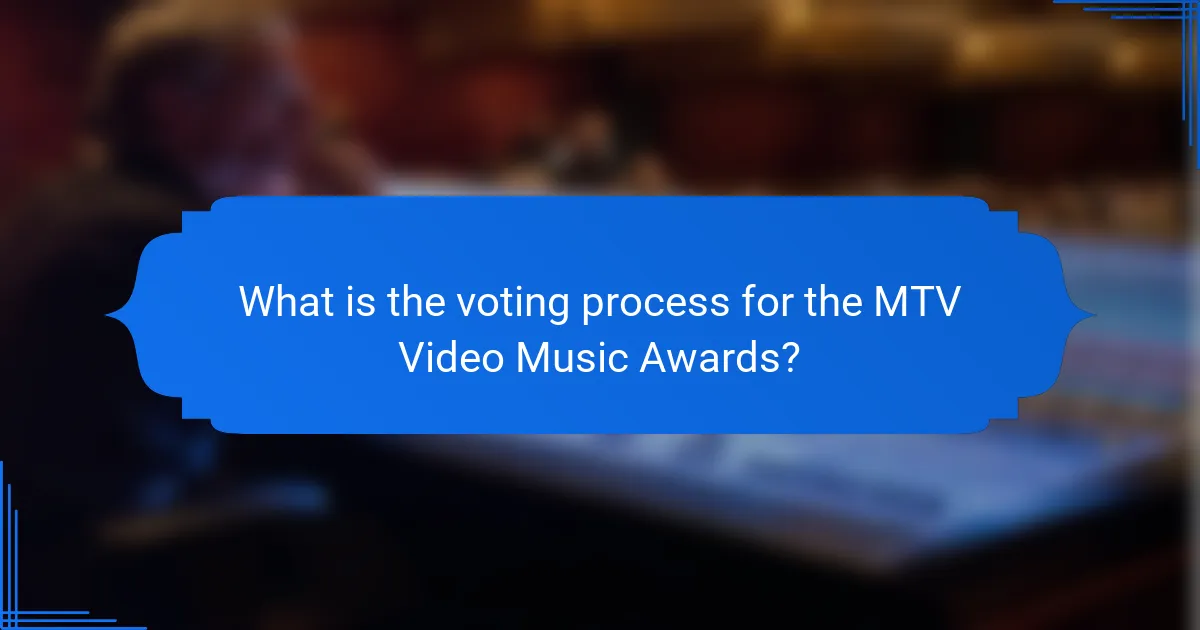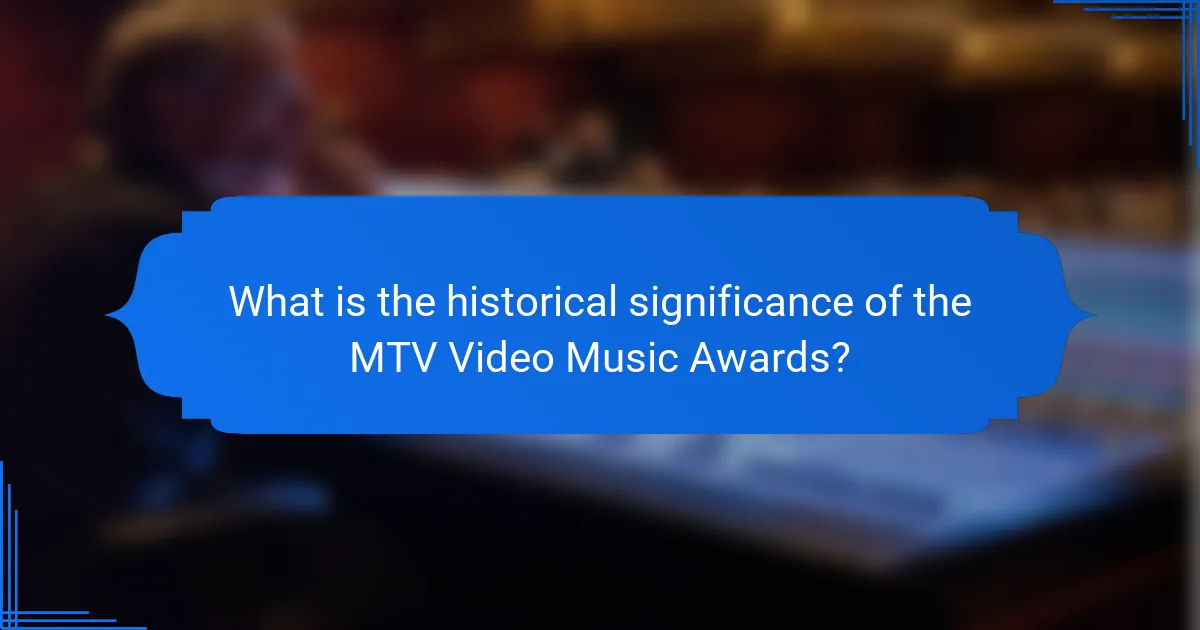The MTV Video Music Awards (VMAs) are an annual ceremony recognizing excellence in the music video industry, first held on August 31, 1984. The awards feature various categories, including Video of the Year and Best New Artist, and highlight live performances that often create cultural moments. The voting process consists of two phases: initial nominations by industry professionals and final public voting, which engages fans through the MTV website and social media. The VMAs have played a crucial role in shaping music trends and pop culture, reflecting societal changes and influencing the careers of numerous artists over the years.

What are the MTV Video Music Awards?
The MTV Video Music Awards (VMAs) are an annual awards show presented by MTV. They honor outstanding achievements in the music video industry. The first VMAs took place on August 31, 1984. The awards celebrate artists across various genres and categories. Notable categories include Video of the Year and Best New Artist. The event features live performances and unique moments, often becoming a cultural phenomenon. The VMAs are known for their influence on pop culture and music trends. They attract millions of viewers each year, showcasing the evolution of music and artistry.
How did the MTV Video Music Awards originate?
The MTV Video Music Awards originated in 1984 as a response to the growing influence of music videos. MTV sought to celebrate the artistry and impact of these videos. The first ceremony took place on September 14, 1984, in New York City. It featured performances and awards for various categories, highlighting popular music. The event aimed to attract a younger audience and boost viewership for the channel. The inaugural show included memorable moments, such as Madonna’s iconic performance. Over the years, the VMAs became a significant cultural event, showcasing not just music but also fashion and social issues. The awards continue to evolve, reflecting changes in the music industry and pop culture.
What was the cultural context of the first MTV Video Music Awards?
The first MTV Video Music Awards took place in 1984. This event emerged during a transformative period in music and pop culture. The early 1980s saw the rise of music videos as a dominant form of artistic expression. MTV, launched in 1981, played a crucial role in promoting artists through visual storytelling. The awards aimed to celebrate this new medium and its impact on music. The event was marked by a blend of music, fashion, and celebrity culture. It reflected the growing importance of visual aesthetics in the music industry. Notable performances included Madonna’s provocative display, which set the tone for future awards shows. The cultural context highlighted a shift towards a more visual and performance-oriented approach in music.
Who were the key figures involved in the establishment of the awards?
The key figures involved in the establishment of the MTV Video Music Awards include Bob Pittman and Judy McGrath. Bob Pittman was the original president of MTV Networks. He played a crucial role in conceptualizing the awards show. Judy McGrath was the head of MTV and helped shape the event’s format. Their combined efforts led to the first awards ceremony held in 1984. This event aimed to celebrate music videos and their impact on popular culture. The inaugural show featured memorable performances and unique award categories. Their vision established a platform that continues to honor artists today.
What is the significance of the MTV Video Music Awards in pop culture?
The MTV Video Music Awards (VMAs) are significant in pop culture as they showcase and celebrate music videos and artists. Established in 1984, the VMAs have become a platform for artistic expression and innovation. They highlight trends in music, fashion, and performance. Iconic moments, such as Madonna’s “Like a Virgin” performance, have shaped cultural conversations. The awards often reflect societal changes and youth culture dynamics. The VMAs influence music marketing and artist branding strategies. They also provide a space for artists to make political statements. Overall, the VMAs play a crucial role in defining and influencing pop culture trends.
How have the awards influenced music trends and artist careers?
Awards have significantly influenced music trends and artist careers. Winning prestigious awards like the MTV Video Music Awards can elevate an artist’s visibility. This visibility often leads to increased album sales and streaming numbers. For example, a study showed that artists who win major awards can see a sales increase of up to 200%. Awards also set industry standards and trends, shaping the direction of popular music. Artists often adapt their styles to align with award-winning trends. Furthermore, nominations can enhance an artist’s credibility and attract new fans. Overall, the impact of awards extends beyond recognition to tangible career advancements.
What are some memorable moments that shaped the history of the awards?
The MTV Video Music Awards have experienced several memorable moments that significantly shaped their history. In 1984, the inaugural ceremony introduced a new platform for music videos. Madonna’s provocative performance of “Like a Virgin” in 1984 became iconic and set the tone for future performances. In 1990, the awards featured a historic performance by MC Hammer, showcasing the rise of hip-hop in mainstream music. The 2003 awards included a surprise kiss between Madonna and Britney Spears, generating widespread media attention. Kanye West’s interruption of Taylor Swift’s acceptance speech in 2009 became a defining moment in pop culture. The 2014 awards honored Beyoncé with the Michael Jackson Video Vanguard Award, marking her influence on the industry. These moments reflect the evolving landscape of music and culture celebrated by the MTV Video Music Awards.

Who are the nominees for the MTV Video Music Awards?
It is not possible to provide the current nominees for the MTV Video Music Awards. Nominees are typically announced shortly before the event. For the latest information, please refer to the official MTV website or recent news sources.
How are nominees selected for the MTV Video Music Awards?
Nominees for the MTV Video Music Awards are selected through a combination of industry input and audience engagement. The process begins with a voting body made up of music industry professionals. This body evaluates music videos released in the eligibility period. The top contenders in various categories are then identified based on their performance and impact. Additionally, fan voting plays a significant role in determining nominees for certain categories. This dual approach ensures that both industry standards and popular opinion are reflected in the nominations. The final list of nominees is announced ahead of the awards ceremony. This selection process highlights the importance of both artistic merit and audience appreciation in the music industry.
What criteria are used to determine eligibility for nomination?
Eligibility for nomination for the MTV Video Music Awards is primarily based on the release date of the music video. The video must be released within the eligibility year, typically from the previous year’s eligibility cut-off date to the current year’s cut-off date. Additionally, the music video must be commercially available and widely distributed. The nominations are also influenced by the artistic merit and impact of the video within the music industry. These criteria ensure that only relevant and significant works are considered for recognition.
Who are the voting members involved in the nomination process?
The voting members involved in the nomination process for the MTV Video Music Awards are primarily industry professionals. This group includes members of the music industry, such as record label executives and music producers. Additionally, voting members may include artists and musicians who have previously been nominated or awarded. The nomination process is overseen by the MTV voting body, which ensures fairness and representation. This body is responsible for selecting nominees based on their artistic merit and popularity. The inclusion of diverse industry professionals aims to reflect a broad spectrum of musical genres and styles.
What categories are available for nomination at the MTV Video Music Awards?
The MTV Video Music Awards feature several categories for nomination. These categories include Video of the Year, Artist of the Year, Song of the Year, and Best New Artist. Additional categories are Best Pop, Best Hip-Hop, Best Rock, and Best R&B. There are also awards for Best Collaboration and Best Cinematography. The categories may vary slightly each year, reflecting current trends in music and video. The MTV VMAs have recognized these categories since their inception in 1984, showcasing a wide range of musical talent.
What are the different award categories and their significance?
The MTV Video Music Awards feature several award categories, each with specific significance. The “Video of the Year” award recognizes the best overall music video. “Best New Artist” highlights emerging talent in the music industry. “Best Pop Video” celebrates excellence in pop music videos. “Best Hip-Hop Video” honors outstanding hip-hop music videos. “Best Rock Video” acknowledges exceptional rock music videos. “Best Dance Video” focuses on the best in dance music. “Best Art Direction” and “Best Choreography” reward artistic and dance creativity in videos. Each category serves to acknowledge and celebrate diverse styles and contributions within the music industry.
How have categories evolved over the years?
Categories at the MTV Video Music Awards have evolved significantly since their inception in 1984. Initially, the awards featured a limited number of categories focused primarily on music videos. Over the years, the categories expanded to include more diverse genres and formats, reflecting changes in the music industry. For example, categories for Best Hip-Hop Video and Best Pop Video were introduced as these genres gained popularity.
In 2017, the awards recognized the importance of social issues by introducing the Best Fight Against the System category. The expansion of categories also included gender-neutral awards, such as the introduction of the Best Artist category in 2021, moving away from gender-specific distinctions.
This evolution demonstrates the awards’ adaptability to cultural shifts and audience preferences. The changes in categories highlight the MTV Video Music Awards’ role in promoting inclusivity and acknowledging the diverse landscape of contemporary music.

What is the voting process for the MTV Video Music Awards?
The voting process for the MTV Video Music Awards involves two main phases: nomination and final voting. Initially, a group of industry professionals selects nominees in various categories. This selection occurs through a voting body composed of music industry experts.
Once the nominees are announced, the public can vote for their favorites. Public voting typically takes place through the MTV website and social media platforms. Each voter can cast votes for their preferred nominees in specific categories.
The final winners are determined by a combination of public votes and the voting body’s input. This hybrid voting system ensures a mix of industry expertise and fan engagement. The results are then revealed during the live awards ceremony.
How can fans participate in the voting process?
Fans can participate in the voting process for the MTV Video Music Awards by visiting the official voting website. They must create an account or log in to vote. Voting typically occurs during a specified period announced by MTV. Fans can cast votes for their favorite nominees in various categories. Each voter may be limited to a certain number of votes per category. The process encourages engagement and excitement among fans. Official announcements provide specific details on voting dates and methods. This participation allows fans to influence the outcome of the awards.
What platforms are available for fan voting?
Fan voting for the MTV Video Music Awards is available through multiple platforms. Fans can vote on the official MTV website. Additionally, voting is accessible via the MTV app. Social media platforms like Twitter also allow for fan votes through specific hashtags. These methods ensure broad participation from fans. The official website and app provide a user-friendly interface. Voting typically opens a few weeks before the event. This accessibility increases fan engagement and excitement.
What are the rules and guidelines for fan voting?
Fan voting for the MTV Video Music Awards is governed by specific rules and guidelines. Fans can cast their votes online during the voting period, which is typically announced prior to the event. Each voter may submit a limited number of votes per category, ensuring fairness in the selection process. Voting is usually restricted to certain platforms, such as the official MTV website or designated social media channels. Votes are often counted in real-time, allowing fans to see the impact of their participation. Additionally, eligibility criteria may apply, such as age restrictions or geographic limitations. These guidelines ensure that the voting process is transparent and accessible to a broad audience.
How is the final winner determined in the MTV Video Music Awards?
The final winner in the MTV Video Music Awards is determined through a voting process. Fans vote for nominees in various categories. The voting typically occurs online and is open for a specified period. Each category may have different voting rules, but fan votes play a significant role. Additionally, a panel of industry professionals may also influence the final outcome. This combination of fan and expert input ensures a balanced decision. The results are then announced during the award ceremony. This process has been established to promote audience engagement and reflect popular opinion.
What role do industry professionals play in the final voting?
Industry professionals serve as key voters in the final selection process of the MTV Video Music Awards. They contribute their expertise and insights, ensuring that the voting reflects industry standards. These professionals include artists, producers, and other notable figures in the music industry. Their votes carry significant weight due to their experience and knowledge of the industry’s dynamics. The inclusion of industry professionals helps maintain the credibility of the awards. Their participation also promotes a diverse range of perspectives in the final outcome. This structured voting process is designed to balance public opinion with professional judgment. Ultimately, industry professionals play a crucial role in determining the winners of the MTV Video Music Awards.
How are the votes counted and verified?
Votes for the MTV Video Music Awards are counted and verified through a secure and systematic process. The voting is conducted online, with fans casting their votes for nominees in various categories. Each vote is recorded and aggregated using secure technology to ensure accuracy. The counting process is monitored by an independent accounting firm. This firm verifies the results to maintain transparency and integrity. The final results are then announced during the awards ceremony. This method ensures that the voting process is fair and trustworthy.

What is the historical significance of the MTV Video Music Awards?
The MTV Video Music Awards (VMAs) hold significant historical importance in the music industry. Established in 1984, they revolutionized how music videos were perceived and promoted. The VMAs introduced a platform for artists to showcase their creativity through visual storytelling. They have influenced music trends and popular culture significantly. Iconic performances, such as Madonna’s 1984 “Like a Virgin,” marked pivotal moments in pop history. The awards have also sparked conversations about social issues, such as race and gender representation. Over the years, the VMAs have become a cultural touchstone, reflecting societal changes and evolving music styles. Their impact extends beyond awards, shaping the careers of numerous artists and redefining music marketing strategies.
How have the MTV Video Music Awards impacted the music industry?
The MTV Video Music Awards have significantly influenced the music industry by shaping trends and promoting artists. Since their inception in 1984, they have provided a platform for innovative music videos. This exposure often leads to increased sales and chart success for nominated artists. For example, Michael Jackson’s “Thriller” gained immense popularity after winning multiple awards. The event has also introduced new genres to mainstream audiences, such as hip-hop and pop-punk. Additionally, the VMAs have sparked cultural conversations through memorable performances and moments. Artists often use the platform to make political statements, further impacting public discourse. Overall, the VMAs have played a crucial role in defining music trends and artist visibility.
What trends in music and performance have emerged from the awards?
Emerging trends in music and performance from the MTV Video Music Awards include increased genre diversity and the rise of virtual performances. The awards have showcased a wider array of musical styles, reflecting the eclectic tastes of contemporary audiences. Artists from genres like hip-hop, pop, and electronic music have gained prominence. Virtual performances have become more common, especially during the pandemic, allowing artists to reach global audiences. Additionally, collaborations between artists from different genres have become a hallmark of recent awards. These trends indicate a shift towards inclusivity and innovation in music and performance.
How have the awards contributed to the recognition of diverse artists?
The MTV Video Music Awards have significantly contributed to the recognition of diverse artists. These awards have provided a platform for artists from various backgrounds to showcase their work. Historically, the VMAs have celebrated artists of different races, genders, and [censured] orientations. For example, in 1999, Lil’ Kim made a statement by wearing a purple pasty at the VMAs, highlighting representation in the industry. Additionally, the introduction of categories like Best Latin Video reflects the growing acknowledgment of diverse musical genres and cultures. The awards have also featured performances by artists such as Bad Bunny, who brought Latin music to a mainstream audience. Overall, the VMAs have played a vital role in amplifying voices that might otherwise be overlooked in the music industry.
What controversies have arisen in the history of the MTV Video Music Awards?
The MTV Video Music Awards have faced several controversies throughout their history. One notable incident occurred in 1984 when Madonna’s performance of “Like a Virgin” sparked outrage due to its provocative nature. In 2003, the infamous kiss between Madonna and Britney Spears during the awards drew significant media attention and mixed reactions from the public. The 2009 awards featured Kanye West interrupting Taylor Swift’s acceptance speech, which ignited a widespread debate about respect and behavior in the music industry. Additionally, the 2015 ceremony faced backlash for its lack of diversity among nominees, highlighting ongoing issues related to representation in the music industry. These events exemplify the awards’ ability to generate discussion and controversy within popular culture.
What notable incidents have sparked public debate?
Notable incidents that have sparked public debate at the MTV Video Music Awards include the 2003 kiss between Madonna and Britney Spears. This moment challenged norms around sexuality and celebrity culture. Another significant incident was Kanye West interrupting Taylor Swift’s acceptance speech in 2009. This event raised discussions about race, gender, and respect in the music industry. The 2015 acceptance speech by Taylor Swift also ignited conversation about feminism and empowerment. These incidents have had lasting impacts on public perception of the awards and the artists involved.
How have controversies affected the perception of the awards?
Controversies have significantly impacted the perception of the MTV Video Music Awards. High-profile incidents, such as Kanye West interrupting Taylor Swift in 2009, drew widespread media attention. This event shifted public focus from the awards’ artistic merit to celebrity behavior. Additionally, controversies surrounding nominations and voting processes have led to accusations of bias. Critics argue that certain artists are favored over others, which affects audience trust. These perceptions can diminish the awards’ credibility and prestige over time. Overall, controversies often overshadow the intended celebration of music and creativity.
What can viewers expect from future MTV Video Music Awards?
Viewers can expect innovative performances and high-profile celebrity appearances at future MTV Video Music Awards. The awards are known for their vibrant showcases of musical talent. Historically, the event features elaborate staging and unique collaborations. Fans can anticipate the inclusion of trending artists and popular songs. The voting process may evolve to incorporate more digital engagement. This aligns with the increasing influence of social media on music consumption. Additionally, viewers can expect surprise moments and memorable speeches. The MTV Video Music Awards consistently aim to reflect current music trends and cultural conversations.
What trends are emerging for future nominations and performances?
Emerging trends for future nominations and performances at the MTV Video Music Awards include increased diversity and representation. This trend reflects a broader cultural shift towards inclusivity in the music industry. Artists from various backgrounds are gaining recognition and nominations. The rise of digital platforms is also influencing performance styles. Virtual and hybrid performances are becoming more common. Additionally, there is a growing emphasis on social and political themes in performances. This aligns with the audience’s demand for meaningful content. Data shows that performances addressing social issues receive higher engagement. These trends indicate a significant evolution in how the MTV Video Music Awards approach nominations and performances.
How is the MTV Video Music Awards adapting to changing music landscapes?
The MTV Video Music Awards is adapting to changing music landscapes by incorporating diverse genres and platforms. In recent years, the awards have included categories for genres like K-pop and Latin music. This reflects the growing popularity of these genres globally. Additionally, the VMAs have embraced social media and streaming platforms for voting and engagement. This shift allows for greater audience participation and reflects current consumption trends. The introduction of fan-voted categories highlights this emphasis on audience involvement. The VMAs also feature performances that blend various musical styles, showcasing the evolution of the music industry. These adaptations ensure the awards remain relevant in a rapidly changing environment.
The MTV Video Music Awards (VMAs) are an annual event that recognizes achievements in the music video industry, celebrating artists across various genres since their inception in 1984. The article covers the origins of the VMAs, their cultural significance, and the evolution of categories and voting processes over the years. It highlights key figures involved in establishing the awards, memorable moments that have shaped their history, and the impact of the VMAs on music trends and artist careers. Additionally, it discusses the nomination and voting processes, criteria for eligibility, and how the awards adapt to changing music landscapes.
